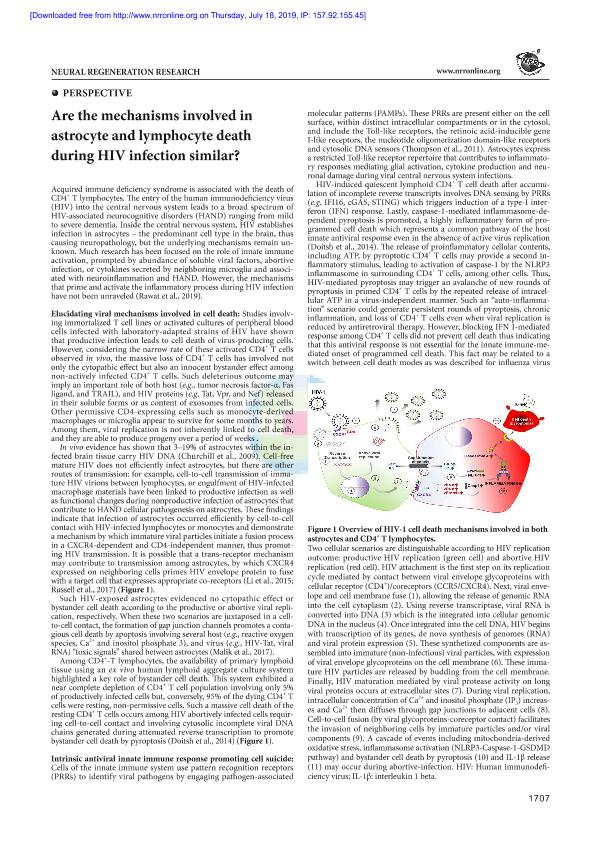Mostrar el registro sencillo del ítem
dc.contributor.author
Ojeda, Diego Sebastian

dc.contributor.author
Till, Andreas
dc.contributor.author
Quarleri, Jorge Fabian

dc.date.available
2020-08-21T20:29:38Z
dc.date.issued
2019-10
dc.identifier.citation
Ojeda, Diego Sebastian; Till, Andreas; Quarleri, Jorge Fabian; Are the mechanisms involved in astrocyte and lymphocyte death during HIV infection similar?; Shenyang Editorial Dept Neural Regeneration Res; Neural Regeneration Research; 14; 10; 10-2019; 1707-1708
dc.identifier.issn
1673-5374
dc.identifier.uri
http://hdl.handle.net/11336/112181
dc.description.abstract
Acquired immune deficiency syndrome is associated with the death of CD4+ T lymphocytes. The entry of the human immunodeficiency virus (HIV) into the central nervous system leads to a broad spectrum of HIV-associated neurocognitive disorders (HAND) ranging from mild to severe dementia. Inside the central nervous system, HIV establishes infection in astrocytes – the predominant cell type in the brain, thus causing neuropathology, but the underlying mechanisms remain unknown. Much research has been focused on the role of innate immune activation, prompted by abundance of soluble viral factors, abortive infection, or cytokines secreted by neighboring microglia and associated with neuroinflammation and HAND. However, the mechanisms that prime and activate the inflammatory process during HIV infection have not been unraveled (Rawat et al., 2019).
dc.format
application/pdf
dc.language.iso
eng
dc.publisher
Shenyang Editorial Dept Neural Regeneration Res

dc.rights
info:eu-repo/semantics/openAccess
dc.rights.uri
https://creativecommons.org/licenses/by-nc-sa/2.5/ar/
dc.subject
HIV
dc.subject
ASTROCITOS
dc.subject
INFLAMASOMA
dc.subject
PIROPTOSIS
dc.subject.classification
Enfermedades Infecciosas

dc.subject.classification
Ciencias de la Salud

dc.subject.classification
CIENCIAS MÉDICAS Y DE LA SALUD

dc.title
Are the mechanisms involved in astrocyte and lymphocyte death during HIV infection similar?
dc.type
info:eu-repo/semantics/article
dc.type
info:ar-repo/semantics/artículo
dc.type
info:eu-repo/semantics/publishedVersion
dc.date.updated
2020-05-08T14:12:11Z
dc.journal.volume
14
dc.journal.number
10
dc.journal.pagination
1707-1708
dc.journal.pais
Suiza

dc.journal.ciudad
Ginebra
dc.description.fil
Fil: Ojeda, Diego Sebastian. Consejo Nacional de Investigaciones Científicas y Técnicas. Oficina de Coordinación Administrativa Houssay. Instituto de Investigaciones Biomédicas en Retrovirus y Sida. Universidad de Buenos Aires. Facultad de Medicina. Instituto de Investigaciones Biomédicas en Retrovirus y Sida; Argentina. Universidad de Buenos Aires; Argentina
dc.description.fil
Fil: Till, Andreas. Universitat Bonn; Alemania
dc.description.fil
Fil: Quarleri, Jorge Fabian. Universidad de Buenos Aires; Argentina. Consejo Nacional de Investigaciones Científicas y Técnicas. Oficina de Coordinación Administrativa Houssay. Instituto de Investigaciones Biomédicas en Retrovirus y Sida. Universidad de Buenos Aires. Facultad de Medicina. Instituto de Investigaciones Biomédicas en Retrovirus y Sida; Argentina
dc.journal.title
Neural Regeneration Research

dc.relation.alternativeid
info:eu-repo/semantics/altIdentifier/doi/http://dx.doi.org/10.4103/1673-5374.257519
dc.relation.alternativeid
info:eu-repo/semantics/altIdentifier/url/http://www.nrronline.org/text.asp?2019/14/10/1707/257519
dc.relation.alternativeid
info:eu-repo/semantics/altIdentifier/url/https://www.ncbi.nlm.nih.gov/pmc/articles/PMC6585541/
Archivos asociados
